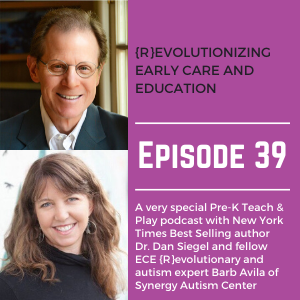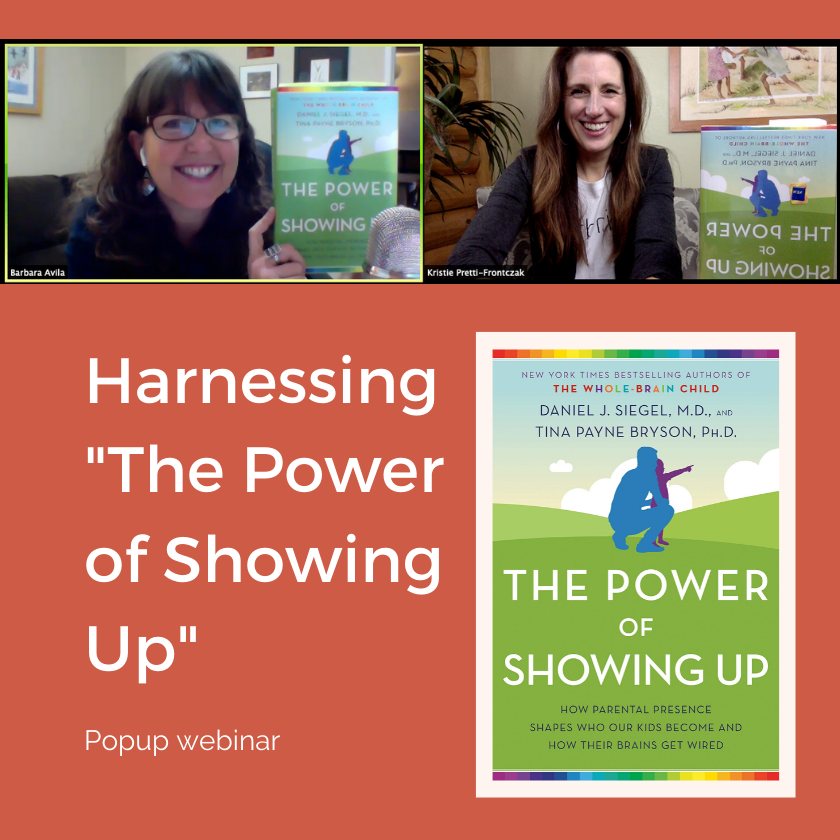
Check out my latest Pre-K Teach and Play podcast episode where I chatted with my longtime friend, colleague, and autism expert Barb Avila, and Dr. Dan Siegel, a New York Times bestselling author and clinical professor of psychiatry.
- Curious about Dan Siegel’s new book, “The Power of Showing Up“?
- Curious about how autism affects secure attachments?
- Curious about how to help children feel safe, seen, and soothed?
This podcast episode dives into some really amazing stuff. For example, we talk about how interpersonal neurobiology intersects with autism and the challenges of forming secure attachments with 24 children at the same time! We also explore the four S’s – how to help children feel safe, seen, soothed, and secure.
We end with a brief conversation that left me knowing just how necessary the ECE {r}evolution is…and a few words of hope from both of my guests.
Listen Now!
Click here to download a transcript for episode 39.
Guest Bios
Dr. Siegel is a clinical professor of psychiatry at the UCLA School of Medicine and the founding co-director of the Mindful Awareness Research Center at UCLA. He is also the Executive Director of the Mindsight Institute which focuses on the development of mindsight, teaches insight, empathy, and integration in individuals, families and communities. Dr. Siegel has published extensively for both the professional and lay audiences. His five New York Times bestsellers are: Aware: The Science and Practice of Presence, Mind: A Journey to the Heart of Being Human, Brainstorm: The Power and Purpose of the Teenage Brain, and two books with Tina Payne Bryson, Ph.D: The Whole-Brain Child, and No-Drama Discipline. His other books include: The Developing Mind, The Pocket Guide to Interpersonal Neurobiology, Mindsight, The Mindful Brain, The Mindful Therapist, and also with Tina Payne Bryson, Ph.D. – The Yes Brain and The Power of Showing Up. Dr. Siegel also serves as the Founding Editor for the Norton Professional Series on Interpersonal Neurobiology which contains over seventy textbooks. For more information about his educational programs and resources, please visit: www.DrDanSiegel.com and www.mindsightinstitute.com
Barbara Avila is the owner and lead consultant at Synergy Autism Center. With over 30 years of experience in the autism field, she specializes in connecting with people on the autism spectrum and coaching parents to become better guides for their children of any age. Barbara holds a Bachelor’s degree in psychology and a Master’s degree in developmental disabilities. She was a certified RDI consultant from 2005-2018 and is also Level 1 Gottman trained. She has worked as a teacher, international trainer, behavior specialist, group-home parent, and has volunteered with many organizations, including the Autism Society of Oregon and Fidgetech. For more information about her work at Synergy Autism Center, please visit: www.synergyautismcenter and www.curiositytoyou.
To Help The Show Out
- Leave an honest review on iTunes. Your ratings and reviews really help and I read each one.
- Subscribe on iTunes
Show Notes
- An Introduction to Interpersonal Neurobiology: This video from Dr. Dan Siegel describes how this interdisciplinary field seeks to find common principles across the evidence-base to identify patterns that help us to better understand the human experience.
- The Yes Brain: This book by Drs. Dan Siegel and Tina Payne Bryson describes how a “no brain” response (acting out or shutting down) happens when the brain reacts to perceived negative input, but how we can cultivate children to have more of a “yes brain” response by teaching kids to approach life with curiosity and openness.
- No-Drama Discipline: This book by Drs. Dan Siegel and Tina Payne Bryson describes the link between children’s development and how parents react to discipline, and then seeks to offer a road map for navigating kids’ big emotions by turning challenging situations into opportunities for growth.
- The Whole Brain Child: This book by Drs. Dan Siegel and Tina Payne Bryson describes how children’s brains work and how we can use that knowledge to support healthy emotional and cognitive development.
- The Power of Showing Up: Drs. Dan Siegel and Tina Payne Bryson’s latest book discusses the importance of being there for children in order to promote optimal development.
- Excerpt from Pop-up Webinar on Harnessing the power of Showing Up: In this excerpt, Barb Avila of Synergy Autism Center talks about the 1st “S” from Drs. Dan Siegel and Tina Payne Bryson’s book “The Power of Showing Up”.
- Presence, Parenting, and the Planet: Talks at Google: In this YouTube video, Dr. Dan Siegel explores three key aspects of children’s future by tying them to the importance of secure attachments and how the “4 S’s” cultivate that security.
- The Developing Mind: In this book by Dr. Dan Siegel, he presents an “integrative framework for understanding the emergence of the growing, feeling, communicating mind”.
- Pocket Guide to Interpersonal Neurobiology: In this book by Dr. Dan Siegel, he examines the “way the mind works via a format that reflects the brain’s natural model of learning (flip the Pocket Guide open to any page and will find an “entry point” that guides you to explore, in your own way, the web of integrated knowledge).”
- Relationship Science and Being Human: In this blog by Dr. Dan Siegel, he discusses our human need for attachment and introduces the concept of alloparenting, or trusting others to care for our young in a cooperative child-rearing manner.
- Introduction to Mindsight: This webpage by Dr. Dan Siegel explores the human capacity to perceive the mind of self and others.
- Attachment Security in Children with Autism: This research study examined the attachment security of a small group of autistic children and found that nearly half of the children were subclassified as securely attached to their caregivers, highlighting important implications with respect to the need and desire for social interaction for those with autism.
- Mirror Neurons in Depth: Dr. Dan Siegel tells us how mirror neurons work and how humans react when mirror neurons are stimulated.
- Social Visual Engagement in Infants and Toddlers with Autism: Early Developmental Transitions and a Model of Pathogenesis: Ami Klin and colleagues “propose a systems biology framework to bridge the gap between genes and symptoms. The framework focuses on basic mechanisms of socialization that are highly-conserved in evolution and are early-emerging in development”.
- Reflective Communication: Cultivating Mindsight through Nurturing Relationships: “This article integrates ideas about mindsight with the concepts of reflective supervision and practice in the birth-to-3 field.”
- The Adaptive Human Parental Brain: Implications for Children’s Social Development: This article describes the brain basis of human parenting, including how the social brain and its three primary networks influence that.
Looking for answers on how to support children who are hard to soothe, hard to connect with, or hard to engage in play?
Well, Barb and I took what we learned from this podcast episode and applied it to a common preschool challenge (described below). Specifically, we facilitated a webinar where we unpacked how to apply the four S’s (safe, seen, soothed, and secure) to preschool situations that are challenging.
Scenario: Preschool classroom serving 12-24 children where the teachers struggle to soothe, read, and/or connect with at least one children who has a diagnosis of autism. Typically, when adults approach the child, the child often runs away. When adults ask the child questions, the child often does not respond. And when adults offer coping strategies they sometimes work and sometimes they don’t.
Real Life Challenges: All too often teaching teams may feel they need to shift to strategies and approaches that emphasize compliance and scheduling the child’s every action. They find the only thing they can do is restrict the child’s options, make things very predictable (and I would argue rigid), and set very specific parameters on how the child can engage with people and materials. They may also assign the child a one-on-one aid who becomes a “shadow” . This adult often doesn’t experience joy in interacting with the child and can become overwhelmed with the responsibility of keeping the child from escalating or withdrawing.
 In this webinar, we took what looks great in theory and research, and applied it to the realities of serving young children in inclusive classrooms.
In this webinar, we took what looks great in theory and research, and applied it to the realities of serving young children in inclusive classrooms.
Save 15% on the webinar through March 8, 2020. Use <Popup15> at checkout here.
And speaking of savings…you can save 15% through March 8th on Dr. Siegel’s online courses. Learn more here and use PreKTeach15% at checkout.